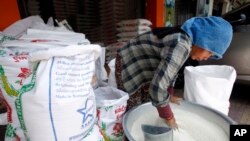Prime Minister Hun Sen said his government will not intervene to prop up rice prices, saying Cambodia was not a “communist country” and that the open markets will determine rice prices.
Speaking at a graduation ceremony in Phnom Penh, Hun Sen said farmers growing high quality rice were getting the same prices as last year, and those farmers complaining of low prices were selling subpar quality paddy.
“The Ministry of Agriculture…has already explained why the price of rice is falling. It has its reasons,” Hun Sen said.
He added that Cambodia was not a “communist country” and could not regulate prices because it had adopted an open market system.
However, the government routinely regulates water and electricity prices, lowering the prices for certain kinds of workers and sections of the population. It also instituted a pricing mechanism for petroleum companies in 2016 and even capped interest rates for microfinance loans in 2017.
In 2016, the government also initiated a plan to nationalize almost all major markets across the country, on account of elections in 2017 and criticism for market vendors about past management.
“We could only make an appeal, but the market mechanism does not require the state to set the prices,” Hun Sen said on Thursday.
Farmers have complained that rice prices have fallen significantly this year, while millers, who buy the paddy for export, say they do not have the working capital to purchase the rice. The government has only been able to provide $50 million of the $200 million shortfall.
The sector was also hit with tariffs to the European Union for three years, after Italy triggered protectionist safeguards in the “Everything But Arms” trade preferences.
Choeun Socheat, a 41-year-old farmer in Battambang province’s Oral commune, who said that prices had dropped by almost half, from 1300 riel per kilogram for fragrant rice to 700 riel. Fragrant rice is high quality rice.
“The rice buyers say they won't buy [rice],” he said. “But, I am just selling it to the millers, even if it is cheap. I need to sell rice to pay the fertilizer and farmland.”
Agriculture expert Yang Saing Koma said the government needed to help under resourced farmers, whether it be pricing, access to new technology or irrigation facilities.
He added that countries intervened in critical agriculture sectors to prevent scarcity and food insecurity, pointing to Thailand, Japan and Malaysia.
“It is needed if we produce less food and there is a potential risk, such as serious natural disasters or to face economic or other sanctions, that makes it impossible for us to produce large quantities of rice,” he said.
Chan Sokheang, deputy director of Cambodia Rice Federation, claimed that climate change was affecting the quality of the rice, but that if millers had enough working capital they could buy the rice at reasonable prices.
While exports to the European Union have dropped this year, rice exports have been steady on account of China significantly increasing its imports of Cambodian rice.







